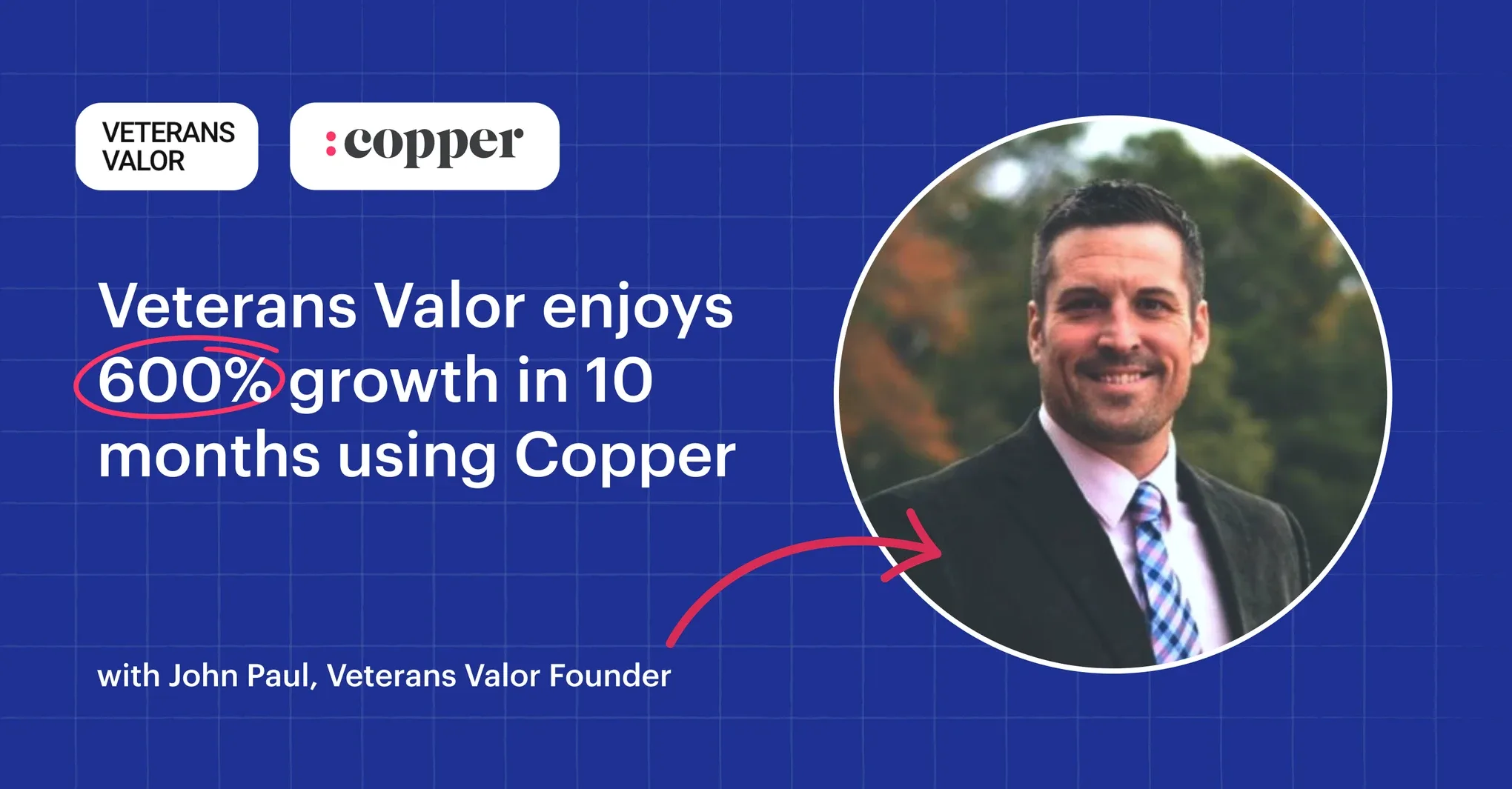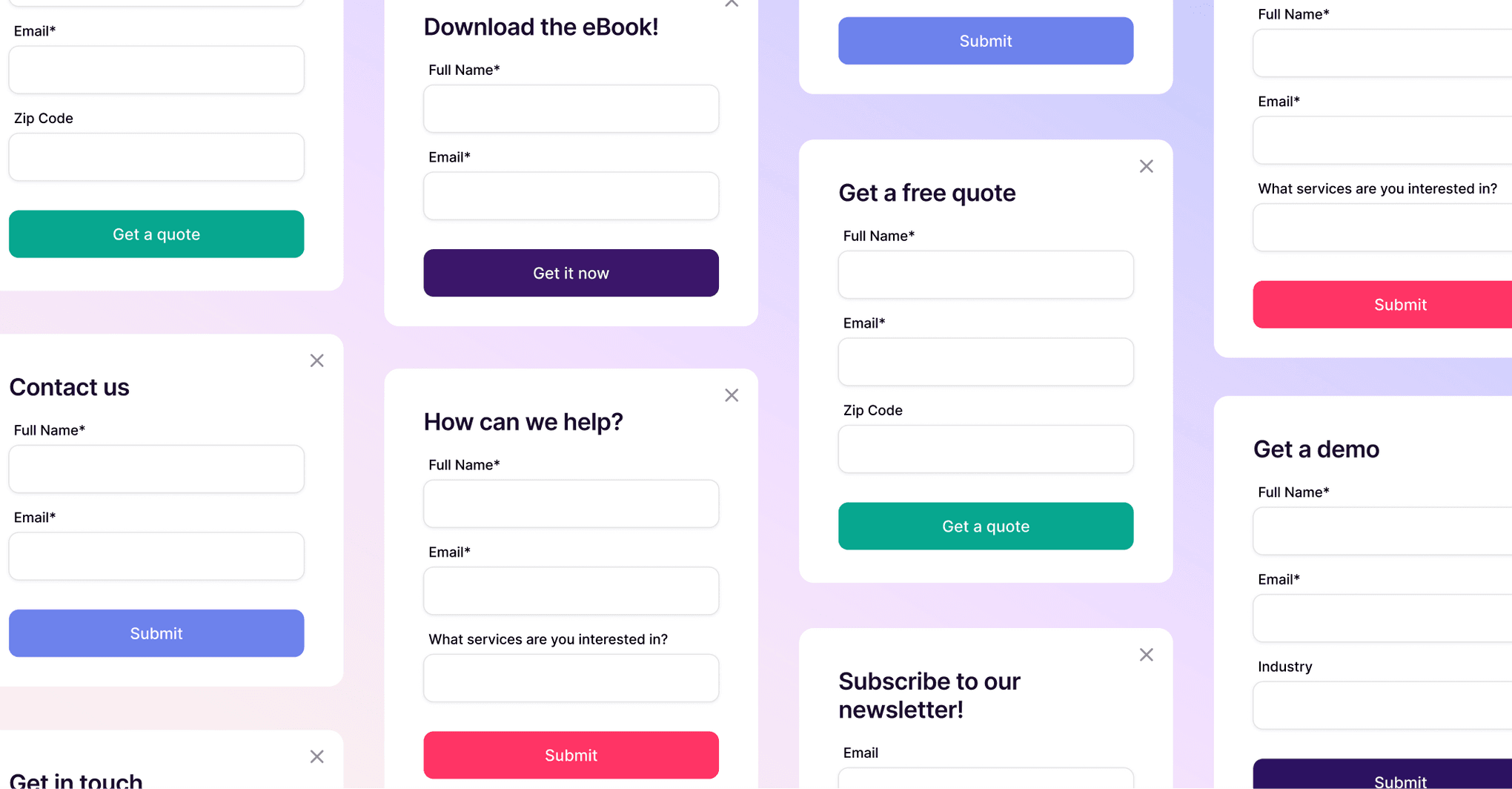Copper Staff
Contributors from members of the Copper team
If you're a consultant, you need clients. That's obvious. But the best way to get them is much less clear.
Should you be blogging? Going to networking events? Starting a newsletter? These marketing strategies for consultants, along with many others, have merit. Choosing the right method for your consultancy, however, can be difficult.
So we've put together this list of 10 ways to market your consulting business. You don't need to do all of them. You just have to pick a few and see if they work. If they do, great! If not, move on to the next option and see if you get better results.
Here's what we'll cover:
- 0. Choose the right niche
- 1. Place Google and social media ads
- 2. Launch an email newsletter
- 3. Host events
- 4. Reach out to potential clients directly
- 5. Attend networking events
- 6. Get referrals
- 7. Speak and present at events
- 8. Make connections on social media
- 9. Partner with another consultant
- 10. Start a blog
Before we jump into marketing and lead generation for consultants, let's touch on an important related topic:
0. Choose the right niche
This isn't exactly a marketing strategy, but it's a crucial part of an effective consulting career. Highly specific offerings might limit your target market, but they also increase your appeal to potential clients.
As an example, let's say you're marketing your management consultancy. If you market yourself as a management consultant, you'll be competing with every other management consultant out there.
Total Growth Ownership suggests adopting a focused differentiation strategy, so prospects don't pigeonhole you into the same category as other management consultants.
"It’s about crafting a value proposition that is so intricately woven with uniqueness that it becomes challenging for prospects to compare you on an attribute-by-attribute basis."
If you market yourself as a "management consultant for business-to-business (B2B) companies," you'll narrow your target market. This is a good thing.
First, you'll be competing with fewer other consultants. If a competing consultant serves business-to-consumer (B2C) companies, B2B companies won't hire them. Your competition pool just got smaller.
You can go even more niche than that, too.
We've worked with an agency that focuses on branding for sports teams and sports-related organizations. That's a very specific niche, and they've developed a lot of expertise in that area. If someone runs a search for "sports branding consultant" and this agency comes up, they'll know immediately that they're looking at a consultancy with valuable, specialized expertise.
It's worth noting that some people recommend not niching down into a specialty. Greg Faxon, for example, makes a compelling argument that you shouldn't choose a niche—you should instead grow into one.
But whether you decide to niche down or not, you need to know what you're offering and who your target audience is.

1. Place Google and social media ads
Online advertising has an advantage among digital marketing strategies for consultants: it's highly targeted.
Blogging, social media, and in-person events increase your exposure to a lot of people, but it's hard to know if you're reaching the right people.
With ads, you can reach the people who are looking for your services. Or the ones who need your services but don't yet know it.
You could show an ad to people who search for a term related to your topic, target people who work at companies that could be valuable clients, focus on people in your city or state, or use any number of other targeting criteria.
Figuring out the Google keywords to target in your ads isn't always easy. This is where a niche comes in handy.
Running an ad using a keyword like "marketing consultant" will be very expensive and make it hard to stand out among all the other people advertising using that same keyword:
These two consultancies have probably paid a lot of money to be listed at the top of a search like "sales consultant denver."
But what if you were to advertise on a keyword like "Santa Fe artist marketing consultant"? You'll have less competition and it'll be easier to stand out.
On platforms like Facebook and LinkedIn, you can also target people who work in a specific industry or have a certain job title, ensuring that your ads get your business in front of the right people.
One piece of advice: don't over-target your ads. If you target “marketing managers of mid-size companies in Philadelphia,” you could be missing out on some opportunities. What if a CEO knows the company needs help and is searching? Or someone just outside of the city needs your help?
Like anything else, running a successful ad campaign takes practice, trial, and error. Be patient and try different targeting strategies. Use wider or narrower audience targeting. Try different keywords. Experiment with your ad copy.
Eventually, you'll find a strategy that works.
Get the latest from our blog every month
2. Launch an email newsletter
In an article for Consulting Success, Anthony Iannarino, Chris Brogan, Peter Sandeen, and Ian Brodie highlighted the importance of their email marketing efforts. These are big names, and the fact that they get the most value out of email marketing speaks highly of its efficacy.
Of course, starting and running your own email newsletter is a big undertaking.
First, you'll need to get people's contact information. You may have a few clients you can add to your list, but you're going to need a lot of people on your list before it starts to pay dividends.
To get more people interested in your newsletter, you'll probably have to use other content marketing tactics: blogging, creating lead magnets like webinars and ebooks, building a social media presence, and so on.
You need to first convince people that what you have to say is worth listening to. Only then will they be more likely to sign up for your newsletter.
After that, it's a matter of keeping your list organized and up-to-date using business consulting software like a CRM. But a good CRM goes beyond just organizing your contacts and splitting them into lists. You can also integrate it with an email marketing provider.
For example, many businesses use Mailchimp as their go-to email marketing platform, thanks to its easy-to-use templates, automation tools, and robust analytics. However, Mailchimp alone doesn’t offer the full scope of CRM capabilities that consultants need—like sales tracking, contact management, and project workflows. That’s where Copper comes in.
With Copper’s seamless two-way sync with Mailchimp, your contact list remains effortlessly up-to-date. Unlike most CRMs that only push contacts into Mailchimp, Copper ensures that if someone subscribes to your email list from your website or campaign, their information automatically flows back into Copper. This means no lost data, no manual updates—just a fully synced database at all times.
Add Copper contacts to Mailchimp with a click.
Once you've connected the two platforms, you can see who has received a particular email campaign and when they're going to get the next one:
With Copper and Mailchimp, you can make sure your emails actually land with the right people. Segment your list based on what your contacts care about, how they’ve interacted with you before, or the services they’re interested in. That way, every email feels relevant—leading to better engagement, stronger relationships, and more impact.
This integration not only makes it easier to start a newsletter, it also helps you keep track of who's getting which emails—with full context of that customer or prospect’s history with you.
But before you start integrating, here's something to keep in mind about using an email newsletter to market yourself as a consultant: it's not an ad.
Your newsletter should answer people's questions, educate them, and let them get to know you. That's the primary function.
You can dedicate about 20% of your newsletter to advertising. That means you can pitch your services or talk up a sale in one in every five emails. You're building a relationship, not using this as an opportunity to hard-sell—that's the fastest way to get people to unsubscribe, and we don't want that.
Focus on providing something people love to read, and your newsletter will take you far.
Here are a few examples of newsletters that have worked well for consultants:

Pro-tip
Get more from CRM
Learn about all the tasks that a CRM can take off your plate with this free handbook.
3. Host events
Getting face time with potential clients is invaluable. You can let your personality shine and immediately answer questions. If you combine that with providing something they're interested in, you have a great marketing tactic.
Live events help consultants attract the kinds of people that want to do business with them.
Some consultants use webinars to gather people from all over the country or the world (here's a list of webinar tools to help you get started). Others host meetups in their hometown.
Either way, they bring people together to exchange useful information, demonstrate expertise, and build relationships with potential clients.
Not sure what you'd focus your event on? Consider making it about your field of expertise.
If you're an engineering consultant, host a meetup where people can come to learn about new trends in engineering. You (or someone else) can give a presentation to demonstrate your knowledge, then take questions to show people the value you could provide to their company.
Webinars are similar; get a group of people who are likely to have similar interests and questions, share some information, and leave time for chatting at the end.
When you first start your event, you probably won't have a lot of attendees. That's okay. It will build momentum as people start getting value from it and sharing it with their friends.
Before you run your first webinar or event, focus on getting the word out. Social media, LinkedIn groups, Meetup.com, reddit, and any other place that you interact with potential clients are good bets for sharing your event:
4. Reach out to potential clients directly
Inbound marketing is great, but sometimes you have to be proactive. Reaching out to a potential client helps you stand out from the many other consultants out there and, if you do it well, can be a very effective way of getting work.
Of course, you'll have to find potential clients to reach out to. Depending on your field, there are many ways to do that. Here are just a few:
- Look on Crunchbase to find companies who have recently gotten funding.
- Pay attention to local news and listings to find out when new organizations start doing business.
- Pick out a few ideal clients that you would love to work with.
- Hang out in LinkedIn groups to see who's talking about the issues you consult on.
- Peruse business listings to find people in your industry.
Direct outreach can be very effective, but it also takes time. If you send 100 cold emails, you might only get 20 responses—and that's after multiple follow-ups. You'll need to be persistent.
Iko System found that the sixth email in a sequence got a big boost in response rates (even though most email chains stop after one non-response).
Hunter.io also has this comprehensive writeup on how to write a good follow-up email after no response.
So the number of follow-ups is up to you. Just know that it may take a handful of emails and calls—or a lot more than that—to make contact.
Some people even use direct mail to get in touch with potential clients. It's definitely a good way to stand out, but you'll need to make sure that your offer is good enough that they'll want to respond to you.
Robert Bly has some great suggestions for selling consulting services via direct mail at the National Mail Order Association.
5. Attend networking events
Consulting Success ran a survey among consultants and asked them about the types of marketing they do — and the types that work. The second-most effective strategy was networking and events (the most effective was getting work via referrals, which we'll talk about shortly).
The great part about attending events — whether in person or virtual — is that the crowd is focused. Not only are they there to meet other professionals, but many people also go to these events specifically looking for freelancers, consultants, and other service providers.
Finding events geared towards your area of consulting can make the process even more effective. If you offer marketing consulting services, go to marketing meetups. If you work with small businesses, go to local business networking meetings.
You can also go to industry conferences, chamber of commerce meetings, boot camps, speed networking events, and any other event that sounds like it could work for your consultancy.
If you're not used to networking, it can be intimidating — and a big challenge. But with some practice, it'll become much easier. Once you've done it a few times, it becomes second nature. (Here are some tips for virtual networking, too).
Watch this video for some conference networking tips from our Events + Social team.
6. Get referrals
The only thing that makes consultants more money than networking, according to Consulting Success's survey, is referrals.
When a client of yours refers someone else, you're already several steps ahead. You know they're interested in your area of service. They've already heard about you, and they're probably looking for the kind of help that you provide.
In short, they're qualified and ready to receive a sales pitch. You don't have to go through the lead generation process, so you can just skip right to qualifying or sales. It saves you a lot of time.
Of course, getting referrals isn't always easy. You'll have to regularly remind your clients that you're looking for referrals and you might even need to set up a referral bonus or system. You can offer referrals to other businesses and hope they return the favor or even partner with another business that provides a complementary service.
Don't forget to look to your past clients for referrals, too. Check your CRM or business consulting software for past clients and people you’ve networked with to see who might give you a referral based on your relationship history, their industry, and other information you have about them:
Copper helps you stay connected with prospects and past clients in your consulting business by organizing all your past interactions in one place. You can easily pull up your history with clients, including emails and notes, making follow-up conversations feel seamless even after some time has passed.
Reaching out to check in with a client is simple, and you can use automated follow-ups and emails to subtly request a referral in later communications. With Copper's built-in features, you can try out different approaches to re-engage with clients and increase referrals.
For help getting started, check out "How to Get More Customer Referrals."

The CRM for Google Workspace
See why customers love our native Google integration
Start a free 14-day trial, no credit card needed.
7. Speak and present at events
Speaking and presenting can be like networking events—but even better. You’re not just shaking hands and exchanging business cards; you’re showing off your skills and expertise to a group of people who actually want to hear from you. Not only is it a subtle sales strategy for your consulting business, it’s also great way to help people by sharing useful insights.
There are so many ways you can jump into these opportunities. You could share your knowledge at a local meetup or you could give a presentation at a conference that shows off your expertise in a particular niche (this is one of the best ways to get sales leads at trade shows). It’s a fantastic way to get more eyes on your consulting business and attract new leads.
But, when it comes to speaking events, it’s less about promoting your consulting business directly and more about the value you can bring to the table. Think of it this way: every time you step up to speak, you’re offering the audience something they didn’t have before—whether that’s new insights, fresh ideas, or actionable tips they can take back to their own work. That’s the real value.
It’s not about pushing your services or pitching yourself. Instead, you’re building trust and credibility by genuinely helping people. When they see the depth of your knowledge and how it applies to their challenges, they’ll naturally connect the dots and see the value of working with you down the line. In the long run, this positions you as a go-to expert, which is far more impactful than any sales pitch.
You get to share your passion, connect with people who are excited about the same things, and make a real difference in their professional lives. That’s the kind of impact that goes beyond just business—it’s about contributing to a community and elevating the conversation in your field. And in the end, that kind of value is what leaves a lasting impression.
And don’t forget to wrap things up by letting people know you’re happy to chat afterward if they want to learn more or explore working together. Speaking of which, stick around once your presentation is done! Take the time to meet people who are interested, walk around, and connect with others. These events are goldmines for networking, so take full advantage!
Pro-tip: Social media is a bit like your email newsletter. It's not about selling—it's about making connections with people.
Few people are ready to buy right now, so you'll want to make a name for yourself by providing useful and entertaining social posts. Then, when people are ready to hire a consultant, they'll remember you, because they’ve become acquainted with you through repeated interactions.
If you're not sure how you'd use social media, check out consultants in your field online. See what they're sharing and how they're helping their followers, providing value, and making connections. Try not to copy their exact tactics though (unless you can do it better)—use them for inspiration on developing your own.
9. Partner with another consultant
Lots of consulting services go well together:
- Web design and content writing
- Engineering and legal
- Marketing and sales
- Management and operations
- Financial and human resources
Pro-tip: If you can find someone who works in a field that complements yours, you can partner to help each other with business.
Let's say you're a sales consultant. You might find a local marketing consultant and offer to send business their way—if they'll consider doing the same.
Once clients are done getting marketing help, they'll likely want help with sales. And if they've engaged a sales consultant, there's a good chance they want to improve their marketing, too. Use your connections to build a pipeline of referrals from other consultants.
10. Start a blog
If you want to use content marketing to your advantage as a consultant, starting your own blog is a great way to go. It lets you share your expertise with the world, reach your audience, and grow your following (which you can then reach with your newsletter).
But growing a blog readership isn't easy. You need to post consistently and provide value to your readers. That might mean tips on what people in your industry are facing, or it could be thought leadership that helps people understand difficult concepts.
There's no one right way to run a blog—especially as a consultant. Try different topics to see what resonates with readers. Post at different rates and see if daily or weekly posts fare better. Partner with other bloggers to share each other's posts and take advantage of a wider audience.
Here's a great example of a short blog post by a marketing consultant. In it, Chris Brogan defines a problem, shares his audience's experience, and suggests a few actions to take to get better results. It's to the point, provides valuable information, and speaks specifically to the people he's trying to bring to his consultancy.
In the end, it's best to start with a few ideas and go from there. Your blog might grow exactly how you imagined—or it could turn into something completely different. If you're not sure how to get started, check out Ryan Robinson's guide to starting a blog.
Find the marketing strategy that works for your consulting business
Every consultant finds a different mix of marketing consulting strategies that works for them. You might go all in on social media. Or spend most of your time asking for referrals. Or you could run a newsletter, go to events, give presentations, and write a blog.
The mix that will work best for you depends on how you like to market and where your customers are. If your potential clients aren't going to local networking events, don't go to local networking events! Find where they spend their time and meet them there.
One final note: keep marketing even when your calendar is full. You never know when a client will have to cancel their contract (or disappear from the face of the earth). Continue looking for clients and make a habit out of your marketing strategies to make sure you always have a pipeline of consulting projects ready to go.







8. Make connections on social media
Social media can be an awesome tool for consultants, but let's be real—social selling isn't easy. It’s about more than just posting: it’s about building relationships and providing value to your audience. But the good news is, with the right approach, it can make a huge difference for your marketing and consulting strategy.
The key to success on social media in 2024? Focus on engagement over numbers. It’s better to have a smaller, active community than thousands of passive followers. Share things that genuinely help people—think tutorials, behind-the-scenes glimpses, insider tips, or even updates about changes in your industry that others may not have noticed yet. The more value you offer, the more people will engage with you and come to see you as a go-to expert.
You also want to stay up to date with what’s trending on each platform. For example, LinkedIn is big on candid, authentic videos where people share their expertise and experiences directly with the camera—think less polish, more personality. On Instagram, Stories and Reels are where the action is, giving you a quick and easy way to connect with your audience.
And here’s a new tip for 2024: try out interactive content. Polls, Q&As, and “Ask Me Anything” sessions can really boost engagement. These give people a chance to connect with you more personally and build that trust that leads to referrals or new clients. It may take some time to build momentum, but with consistency and a little creativity, social media can become one of your best tools for growing your consulting business.